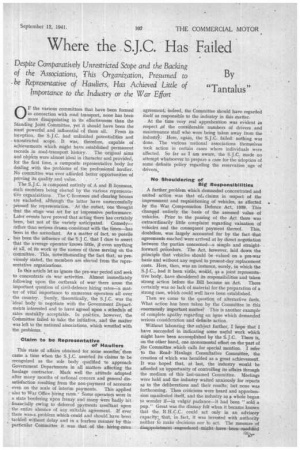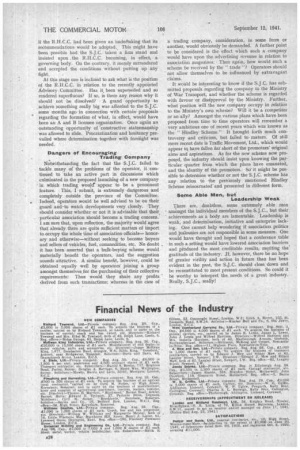Where the .S.J.C. Has Failed
Page 29

Page 30

If you've noticed an error in this article please click here to report it so we can fix it.
By "Tantalus"
0 F the various committees that have been formed in connection with road transport, none has been more disappointing in its effectiveness tban the Standing Joint Committee, yet it should have been the
most powerful and influential Of them all. From its inception, the S.J.C. had unlimited potentialities anti unrestricted scope. It was, therefore, capable of. achievements which might have established permanent
records in road-transport history. The -original aims and objects were almost ideal in 'character and provided, for the first time, a composite representative body for dealing with the. problems of the professional haulier. No committee was ever afforded better opportunities of
proving its quality and value. '
The S.J.C. is composed entirely of A and B licensees, such members being elected by the various representatiiie organizations. The C licensees and clearing houses are excluded, although the latter have unsuccessfully pressed for representation. At the outset, one thought that the stage -was set for an' impressive performance.
Later events have proved that acting there has certainly been, but not of the variety anticipated. Comedy— rather than serious drama-consistent with the times—has been in the ascendant. As a matter of fact, so puerile
has been the influence of the S.J.C. that I dare to assert that the average operator knows little, if even anything
at all, of its work or the names of those serving oh the committee. This, notwithstanding the fact that, as previously stated, the members are elected from the representative organizations.
In this article let us ignore the pre-war period and seek to concentrate On war activities. Almost immediately following upon the outbreak of war there arose the important question of civil-defence hiring rates—La matter of vital importance to numerous operators all over the country. Surely, theoretically, the S.J.C. was the 'ideal body to negotiate with the Government Departments interested and to have agreed upon a sthedule of rates mutually acceptable. In practice, however, the Committee failed to take the initiative, and the matter was left to the national aSsociation.s, which wrestled with the problems. .
Claim to be Representative Of Hauliers
This state of affairs obtained for some irionths(then
came a time when the S.J.C. asserted its -claims to be recognized as the sole body qualified •to approach Government Departments in all matters affecting the haulage contractor. Mark well the attitude adopted after many months of national concern and general dissatisfaction resulting from the non-payment of accounts even on the scale of interim payments. This applied
, also to War Office hiring rates.' Some operators were in a state bordering upon frenzy and many Were badly hit financially owing to deferred payments resultant upon the entire absence of any suitable agreement. .If ever : there was-a problem which could and should have been tackled without delay and in a fearless manner by this particular Committee it was that _of the. hiring-rates agreement; indeed, the Committee should have regarded itself as responsible to the industry in this matter.
. At the time very real apprehension was evident In respect _of the considerable numbers of drivers and maintenance staff who were being taken away from the industrir: Here, again, the S.J.C. failed: nothing was done. The various national associations themselvas took action in certain cases where individuals were. affected. So far as I am aware, the S.J.C.. made no attempt whatsoever to prepare a case for the adoption of some definite policy regarding the reservation age of drivers,,
• No Shouldering of Big Responsibilities
A further. problem which demanded concentrated and united action was that of claims in respect of the impressment and requisitioning of vehicles, as affected by the War. Compensation Defence Act, 1939. This changed entirely the basis of the assessed value of vehicles. Prior to the passing of the Act there was extraordinarily little complaint regarding valuation of vehicles and the consequent payment thereof. This, doubtless, was largely accounted for by the fact that agreements reached were arrived at by direct negotiation between the parties concerned—a simple and straightforward procedure. The Act, however, laid down the principle that vehicles should be valued on a pm-war basis and without any regard to present-day replacement costs. Here, then, was an instance, surely, in which the S.J.C., had it been virile, would, as a joint representative body, have shouldered its responsibilities and taken strong action before the Bill became an Act. There certainly was no lack of material for the preparation of a strong case, which could well have been established.
Then we come to the question of alternative fuels. What action has been taken by the Committee in this enormously important matter? This is another example of complete apathy regarding an issue which demanded serious consideration and definite action.
Without labouring the, subject further, I hope that I have succeeded in indicating some useful work which might have been accomplished by the S.J.C. There is, on the other hand, one monumental effort on the part of the Committee which calls for special mention. I refer to the RoadHaulage Consultative Committee, the creation of which was heralded as a great achievement. It was hoped that, at last, the industry would be afforded an 'opportunity of controlling its affairs through the medium of this last-named Committee. Meetings were held and the industry waited anxiously for reports as to the deliberations and their results; but none was forthcoming. Then criticisms were heard and apprehension manifested itself, and the industry as a whole began to wonder if—in vulgar parlance—it had been "sold a pup." Great was the dismay felt when it became known that the. R.H.C.C. could act only in an advisory capacity;, that, in fact, it was invested with authority neither to make decisions nor to act. The measure of disappointment ..:engentlered .might: have been:423culiftlid
if the R.H.C.C. had been given an nndeitaking that its recommendations would be adopted., This might have been possible had the S.J.C. taken a firm stand and insisted upon .the R.H.C.C. becoming, in effect, a governing body. On the contrary, it merely surrendered and accepted the conditions without putting up any fight.
At this stage one is inclined to ask what is the position of the R.H.C.C. in relation to the recently appointed Advisory Committee. Has it been superseded and so rendered superfluous? If so, is there any reason why it should not be dissolved? A grand opportunity to _achieve something really big was afforded to the S.J.C. some months ago in connection with certain proposals regarding the formation of what, in effect, would have been an A and B licensee organization. Once again an outstanding opportunity of constructive statesmanship was allowed to slide. 'Procrastination and hesitancy prevailed where determination together with foreiight was needed. •
Dangers of Encouraging , Trading Company Notwithstanding the fact that the S.J.C. failed to tackle many of the problems of the operator, it continued to take an active part in discussions which culminated in the proposed launching of a new company s in which trading would' appear to be a prominent feature. This, I submit, is extremely dangerous and completely outside the province of the Committee.
• Indeed, operators would be well advised to be on their guard and-to watch developments very closely. • They should consider whether or not it is advisable that their, particular association should become a trading concern. I am sure that, upon reflection, the majority would agree that already there are quite sufficient matters of import to occupy the whole time of associationofficials— honorary and otherwise—without seeking to become buyers and sellers of vehicles, fuel, commodities, etc. No doubt it has been asserted that a bulk-buying scheme would materially benefit the operators, and the suggestion sounds attractive. A similar benefit, however, could be obtained equally well by operators-joining a group amongst themselves for the purchasing of their collective requirements: Thus would they share any profits derived from such transactions; whereas in the case of a trading company, consideration, in some form or another, would obviously be demanded. A further point to be considered is the effect winch such a company would have upon the advertising revenue in relation to association magazines. Then again, how would such a scheme be received by the "trade "? Operators should not allow themselves to be influenced by extravagant It would be interesting to know if the S-. J.C. has submitted proposals regarding the company to the Ministry of War Transport, and whether the scheme is regarded with favour or disipproval by the Ministry. Further, what position will the new company occupy in relation to the Ministry's own scheme? Willit be a competitor or an ally? Amongst the various plans which have been proposed from time to time operators will remember a very ambitious one of recent years which was known as the " Hindley Scheme." It brought forth much controversy and criticism, but failed tomature: Of still more recent date is Traffic Movement, Ltd., which would appear to have fallen far short of the promoters' original aims and aspirations. As for the new scheme now proposed, the industry should insist upon knowing the particular quarter from which the plans have emanated, and the identity of the promoters. Soit might be possible to determine whether or not the S.J.C. scheme has any relation to the previously mentioned Hindley Scheme reincarnatedand presented in different form.
Some Able Men, bui
Leadership Weak Thereare, doubtless, some extremely able men amongst the individual members of the S.J.C., but their achievements as a body are lamentable. Leadership is weak, and determination, initiative and enterprise lacking. One cannot help wondering if association politics and jealousies are not responsible in some measure. One would have thought and hoped that a conference table in such a setting would have lowered association barriers. and produced the most creditable results, meriting the' gratitude of the industry. If, however, there be no hope of greater virility and action in future than has been evident in the past, the S.J.C. should close down and be reconstituted to meet present conditions. So could it be worthy to interpret the needs of a great industry. S.J.C., really!




















































